|
|
Post by hoosier on Apr 1, 2006 18:08:51 GMT -5
I decided to put this here since the line of dialogue in question occurs in this episode but it also ties into the Pilot--
Glen Semple warns Fisk that his squad's record of closing cases will probably be in jeopardy with this one (Rip's unfortunate demise) to which Fisk answers that they "will keep a positive attitude none the less".
This seems to be a point of personal pride with Fisk, that his squad has such a successful closure rate. It is evidently well known around the department from Semple's comment--at least that is how I read it. Could it have factored, to some degree possibly subconsciously, into his attitude towards Jim in the beginnning? Would it (the closure rate) drop with Jim out in the field? Was that possibly one of the underlying reasons why Jim and Karen were assigned to such minor cases (the dog ashes and the bad check) besides just letting the new guy get his feet wet? In his telling Jim ,that if Lyman lawyered up, he and Karen were out of there, even though Marty and Tom had been questioning Lyman for almost 2 hours and he apparently hadn't once asked for counsel? When he kept reminding Jim that he had to be 'respectful'?
Could there have been just a tad more to Fisk's unease, for lack of a better word, than just having the famous blind detective assigned to his squad and not knowing how he was going to make it all work? Could he have been just as worried that their reputation for closing cases could be compromised if Dunbar insisted on going out into the field? I don't think it would be totally out of line to say that Fisk took a certain amount of pride in that reputation.
|
|
|
|
Post by Dreamfire on Apr 1, 2006 21:52:41 GMT -5
But how wonderful( And I have not seen the ep, just gathered what I can from the recaps etc.) that we can have an example on TV of somene trusting their own information and not just Falling into tline because ity is easier and expected?
This is the aspectof JD's character that makes him a hero forme. He does what he needs to DESPITE all the reaosns in the world not to.
Ah,,, purrr,,,
|
|
|
|
Post by bjobsessed on Apr 1, 2006 23:43:54 GMT -5
Hoosier, thanks for giving us something new to think about--I think. It's something I never thought about, but it makes sense.
|
|
|
|
Post by kytdunne on May 8, 2006 5:28:00 GMT -5
I decided to put this here since the line of dialogue in question occurs in this episode but it also ties into the Pilot-- Glen Semple warns Fisk that his squad's record of closing cases will probably be in jeopardy with this one (Rip's unfortunate demise) to which Fisk answers that they "will keep a positive attitude none the less". This seems to be a point of personal pride with Fisk, that his squad has such a successful closure rate. I didn't get anything from that about the squad's reputation for closing cases. The only thing I heard in Semple's comment was that gang killings often went unsolved, and he was not only okay with that, but didn't see much reason to work at it. Kyt |
|
|
|
Post by Dreamfire on May 8, 2006 20:21:28 GMT -5
The back story I surmised from this was all about Semple. He has a tendancy not to solve cases and is sued to making his justifications before hand so he looks less bad.
I thought Fisk's " We'll keep a positive attitude" was quite mild and showed a mindset similar to Dunbar's as shown in other episodes - like telling the Chief of D's they would find the Korean grocery killer. An aligned attitude within the team shows also that Dunbar is melding into this team, despite all the fireworks with Marty and Jim's "bull in a china shop" tendancies. This squad is dedicated to getting the perps -- the right ones -- and Jim Dunbar has exactly the same purpose in mind. Not glory-hounding, not covering his ass, not making life hard to Marty. ( hehe)
"Up on the Roof," where Terry is sitting bleeding when Fisk sends Semple back to his own squad, seems to me to be the culmination of all Semple's bunglings -- starting with that attitude and the over the top colloquialism of the history to the shooting death, through his bungling of the procedures for entering the suspect's appartment and his attempts to cover his ass rather than be an effective cop.
|
|
|
|
Post by hoosier on May 9, 2006 16:48:12 GMT -5
The 8th squad's record of closing cases had to be well known around the department for Semple to have even brought it up especially when he was meeting Fisk for the first time. I thought it was a rather odd opening remark , almost like "lets see what the hot-shots can do with this since we have had absolutely no luck ". Fisk just wasn't rising to the bait.
|
|
|
|
Post by greenbeing on May 9, 2006 17:05:38 GMT -5
The 8th squad's record of closing cases had to be well known around the department for Semple to have even brought it up especially when he was meeting Fisk for the first time. I thought it was a rather odd opening remark , almost like "lets see what the hot-shots can do with this since we have had absolutely no luck ". Fisk just wasn't rising to the bait. I actually didn't think Semple's remark had anything to do with the clearance rate at the 8. I just thought it was an off-hand remark to show he wasn't a great detective, that he didn't really care. More to show us Semple's character than anything about the 8th squad. I figured clearance rate was just always something on the minds of cops. And Fisk took an immediate disliking to Semple. He could have done the same to Jim, but that goes to show Dunbar's a good detective and worth giving a chance. Semple? not so much. I thought Semple and Terry were a good juxtaposition to the teams at the 8. --GB |
|
|
|
Post by maggiethecat on May 9, 2006 18:05:10 GMT -5
I decided to put this here since the line of dialogue in question occurs in this episode but it also ties into the Pilot-- Glen Semple warns Fisk that his squad's record of closing cases will probably be in jeopardy with this one (Rip's unfortunate demise) to which Fisk answers that they "will keep a positive attitude none the less". This seems to be a point of personal pride with Fisk, that his squad has such a successful closure rate. I didn't get anything from that about the squad's reputation for closing cases. The only thing I heard in Semple's comment was that gang killings often went unsolved, and he was not only okay with that, but didn't see much reason to work at it. Kyt Semple's fat, lazy, and wheezing. Not one to jump up and start working a case at white heat. Nuff -- and well -- said, Kyt. Mags |
|
|
|
Post by hoosier on Jul 1, 2006 16:57:12 GMT -5
Why does Jim look at his watch in the opening dream sequence? Seems out of place here unless he is blending two real memories--breakfast with Christie and the shootout. Was he wanting to be sure he was 'on the clock' before helping out? Sheesh.
|
|
|
|
Post by mlm828 on Jul 1, 2006 17:08:33 GMT -5
Why does Jim look at his watch in the opening dream sequence? I always thought the purpose was to establish that he could see in the dream, making it clear that it was a dream. |
|
|
|
Post by maggiethecat on Jul 23, 2006 20:23:02 GMT -5
I was just watching UotR before work and noticed a line I'd never heard clearly before: when they're all standing in the hallway at Bellevue, Glen Semple is talking to a uniform and says, "Ehhh, he wants to be a hero." I'd never thought of what Glen must think of Terry! And perhaps, if even a dimwit like him noticed something was off... And I always assumed Semple was talking about Dunbar, who'd he had met for the first time that day and -- obviously -- could not in any way understand. (Not quite believing that Jim was on the case despite Fisk's pronouncements, that snarky remark about "standing out" with Hank when they got to Rivington Street, etc., etc., etc.) It always made sense to me that Semple would slam Jim for "wanting to be a hero," for wanting to (or thinking he had a right to) continue on the job after being blinded. But for Semple to slam Terry for wanting to be a hero? Never made sense to me, and we always have to give the writers credit for being defensible. Besides, what -- when you get right down to it -- is the least bit heroic about getting shot in the arm by a fleeing perp? That's not heroism. That's bad luck, or being in the wrong place at the wrong time. Which brings us back, as always, to Terry and his twisted mindset. Why would he think that being shot made him a hero . . . unless the very act of being shot somehow put him on a par with Jim? "What would make a guy shoot himself in the arm?" Terry asks Jim at the river. 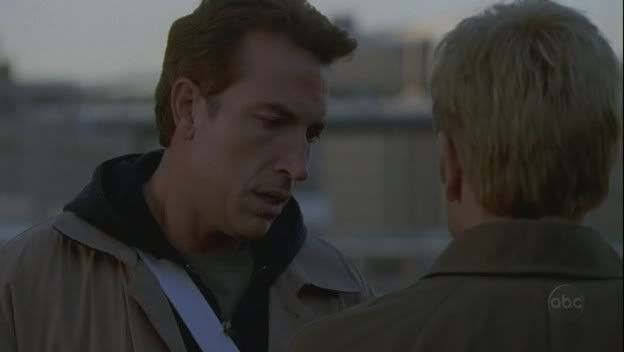 As many times as I've been over every line of this episode (!), I still can't quite wrap my brain around the concept of Terry thinking that a non-disabling bullet wound would equate, in any way, with Dunbar's life-shattering experience. Thoughts, anyone?  |
|
|
|
Post by bjobsessed on Jul 23, 2006 20:48:21 GMT -5
Ok. These are the things that popped into my head right after reading this so feel free to shoot it all to pieces.
Maybe there was a little bit of jealousy going on with Terry over all the attention Jim got for what happened at the bank. I'm sure the ones who died were remembered as heros and the others were brave and some may have received commendations. Of all the cops that survived, who was going to be remembered the most? Jim Dunbar. After all, he put himself in great danger by going for Terry's gun and put his own needs aside in the interest of getting the gunman. Then he and the gunman fire almost at the same time. The gunman dies and Jim is blinded for life. Jim would have been in the news, received thousands of cards from well-wishers etc. Maybe Terry was thinking, "What about me? I put my life on the line too."
Maybe Terry thought that if he got shot in the line of duty and everyone found out that he used to be Jim's partner, that somehow that would put him on the same level as Jim even though it wasn't disabling. Heroic former partners who both took a bullet to serve and protect. Terry did get some attention after that even though it was on a much smaller scale.
Make sense? No, but what makes sense about Terry?
|
|
|
|
Post by greenbeing on Jul 23, 2006 21:08:32 GMT -5
I was just watching UotR before work and noticed a line I'd never heard clearly before: when they're all standing in the hallway at Bellevue, Glen Semple is talking to a uniform and says, "Ehhh, he wants to be a hero." I'd never thought of what Glen must think of Terry! And perhaps, if even a dimwit like him noticed something was off... And I always assumed Semple was talking about Dunbar, who'd he had met for the first time that day and -- obviously -- could not in any way understand. Thoughts, anyone?  Thoughts... Glen was a jerk to everyone. "Black on black crime." "Not for nothing, but you do kinda stand out with the dog." "They opened the door, we identified ourselves, they started to close the door, maybe we pushed in a little..." "Homeboy buddy of his..." "This other bushwacker's chillin' on the futon..." "Ehh, he wants to be a hero." He just didn't have a lot of people skills. So why'd I think he was talking about Terry? Standing in the hallway of the hospital with probably everyone from their precinct. The subject of the day is: Terry got shot. Glen's got a bug up his ass, he's bitter, he knows Terry's not hurt badly. Some cop comes up and says, "Hey, man, your partner got shot"--perhaps thinking Glen might not have had his partner's back?--what's Glen going to say? He's "a big hambag, no one would partner with." He's not the brightest lightbright on the block. He doesn't want anyone thinking he can't do his job. So how's he justify Terry even running--alone--up to the roof after an armed perp in the first place? "Ehh, he just wants to be a hero." Why would I think they're not gossiping about Jimmy Dunbar? Depends most likely on whether or not Terry transferred precincts after Jim got shot. There's a very good chance, after reading all the speculation on the board, that Jim and Terry are both no longer with their old squad. Fisk doesn't say: "Hey, Jim, a couple guys from your old squad." He just says: "Your old partner." Which doesn't mean much. But Jim didn't know Glen, either, so either Glen transferred in after (a cop transfers because he's moving up, or there's a problem; we can't sell change of scenery), moved up after (although what's the chance of a big hambag like him testing up to homicide detective, instead of testing up to something a little more leisurely?). So assuming these guys aren't all Jim's old squad mates, they're at the hospital to talk about the cop who just got shot an hour ago, not about some cop who got shot a year ago, who, admittedly, maybe they're curious about how he's getting on, but, why would they bother asking Glen? And if those guys were from Jim's old squad, I think that's a rife hallway of dramatic possibilities which the writer's skimmed over. --GB |
|
|
|
Post by maggiethecat on Jul 23, 2006 22:03:50 GMT -5
I think that's a rife hallway of dramatic possibilities which the writers skimmed over. --GB To each her own . . . but I have no evidence that the suberb writing team of Blind Justice skimmed over much of anything. Oh, they were wise enough to leave sufficient room for interpretation -- as witness our many wrangles over the past year -- but skim? No. And Jim was coming down the hall with Hank and Semple saw him, clearly, as witness his tacky little remark about "Takin' your dog out for a walk." Granted, Semple was simple, but still . . .  And Dunbar, a participant in the day's events, would be the subject of curiosity and speculation, as we can easily surmise he had been since rejoining the force -- especially considering the media blitz surrounding his return. Not that much of a stretch to think the cops in the hall would be gossiping about him and his part in what had happened that day. |
|
|
|
Post by mlm828 on Jul 23, 2006 23:02:28 GMT -5
I was just watching UotR before work and noticed a line I'd never heard clearly before: when they're all standing in the hallway at Bellevue, Glen Semple is talking to a uniform and says, "Ehhh, he wants to be a hero." I'd never thought of what Glen must think of Terry! And perhaps, if even a dimwit like him noticed something was off... And I always assumed Semple was talking about Dunbar, who'd he had met for the first time that day and -- obviously -- could not in any way understand. . . .It always made sense to me that Semple would slam Jim for "wanting to be a hero," for wanting to (or thinking he had a right to) continue on the job after being blinded. But for Semple to slam Terry for wanting to be a hero? Never made sense to me, and we always have to give the writers credit for being defensible. Besides, what -- when you get right down to it -- is the least bit heroic about getting shot in the arm by a fleeing perp? That's not heroism. That's bad luck, or being in the wrong place at the wrong time. I have a few thoughts.  While I agree that Jim is probably the subject of speculation and gossip throughout the NYPD, I always interpreted the "wants to be a hero" comment as referring to Terry. Why would someone say Jim "wants to be a hero"? He already is -- he doesn't have to do anything to be a hero. In addition, the reaction to Terry's getting shot -- all the cops gathering at the hospital, the living room that smells like a florist's shop -- indicates getting shot by a fleeing perp is considered at least admirable, if not heroic. After all, as far as anyone knew at the time, Terry was shot while pursuing an armed murder suspect. Maybe Glen isn't as big a dimwit as we thought, and he has some inkling of what is really going on with his new partner. Finally, I would have to watch the scene again to be sure, but didn't Glen make the "wants to be a hero" comment before he saw Jim approaching? Edited to add: I watched this scene (any excuse to watch "Up on the Roof"  , and Glen makes the "wants to be a hero" comment before the person he's talking to points out Jim coming down the hall. Which brings us back, as always, to Terry and his twisted mindset. Why would he think that being shot made him a hero . . . unless the very act of being shot somehow put him on a par with Jim? "What would make a guy shoot himself in the arm?" Terry asks Jim at the river.  As many times as I've been over every line of this episode (!), I still can't quite wrap my brain around the concept of Terry thinking that a non-disabling bullet wound would equate, in any way, with Dunbar's life-shattering experience. Thoughts, anyone?  I think it simply shows how distorted Terry's thinking is at this time. His guilt is so overwhelming that he isn't thinking rationally, at least where Jim is concerned. |
|

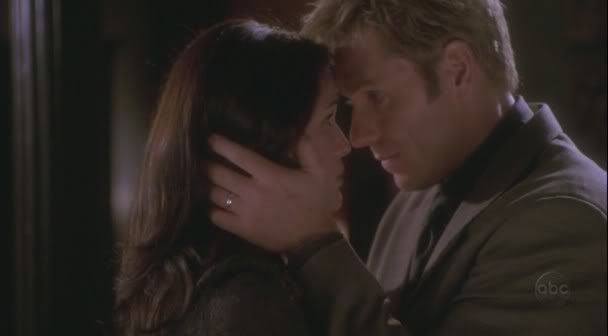

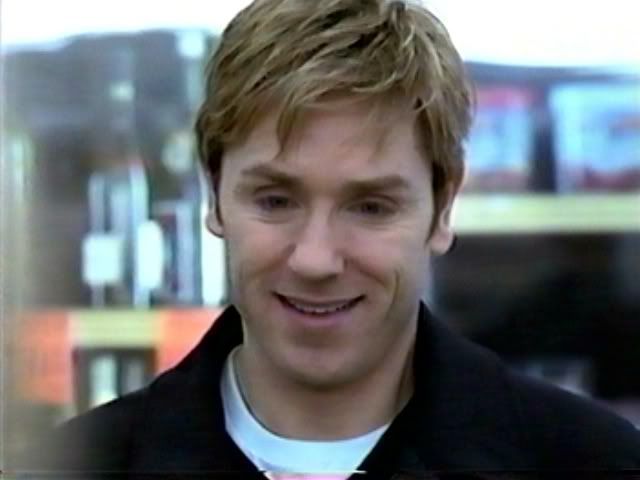




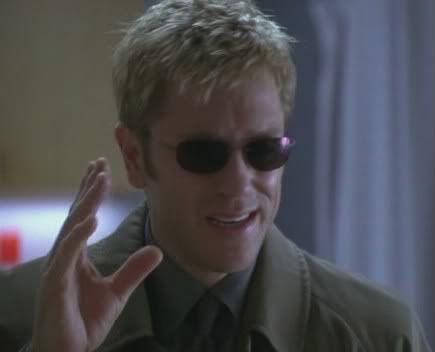

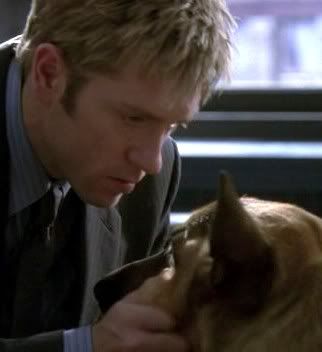



 While I agree that Jim is probably the subject of speculation and gossip throughout the NYPD, I always interpreted the "wants to be a hero" comment as referring to Terry. Why would someone say Jim "wants to be a hero"? He already is -- he doesn't have to do anything to be a hero. In addition, the reaction to Terry's getting shot -- all the cops gathering at the hospital, the living room that smells like a florist's shop -- indicates getting shot by a fleeing perp is considered at least admirable, if not heroic. After all, as far as anyone knew at the time, Terry was shot while pursuing an armed murder suspect. Maybe Glen isn't as big a dimwit as we thought, and he has some inkling of what is really going on with his new partner. Finally, I would have to watch the scene again to be sure, but didn't Glen make the "wants to be a hero" comment before he saw Jim approaching? Edited to add: I watched this scene (any excuse to watch "Up on the Roof"
While I agree that Jim is probably the subject of speculation and gossip throughout the NYPD, I always interpreted the "wants to be a hero" comment as referring to Terry. Why would someone say Jim "wants to be a hero"? He already is -- he doesn't have to do anything to be a hero. In addition, the reaction to Terry's getting shot -- all the cops gathering at the hospital, the living room that smells like a florist's shop -- indicates getting shot by a fleeing perp is considered at least admirable, if not heroic. After all, as far as anyone knew at the time, Terry was shot while pursuing an armed murder suspect. Maybe Glen isn't as big a dimwit as we thought, and he has some inkling of what is really going on with his new partner. Finally, I would have to watch the scene again to be sure, but didn't Glen make the "wants to be a hero" comment before he saw Jim approaching? Edited to add: I watched this scene (any excuse to watch "Up on the Roof"  , and Glen makes the "wants to be a hero" comment before the person he's talking to points out Jim coming down the hall.
, and Glen makes the "wants to be a hero" comment before the person he's talking to points out Jim coming down the hall.